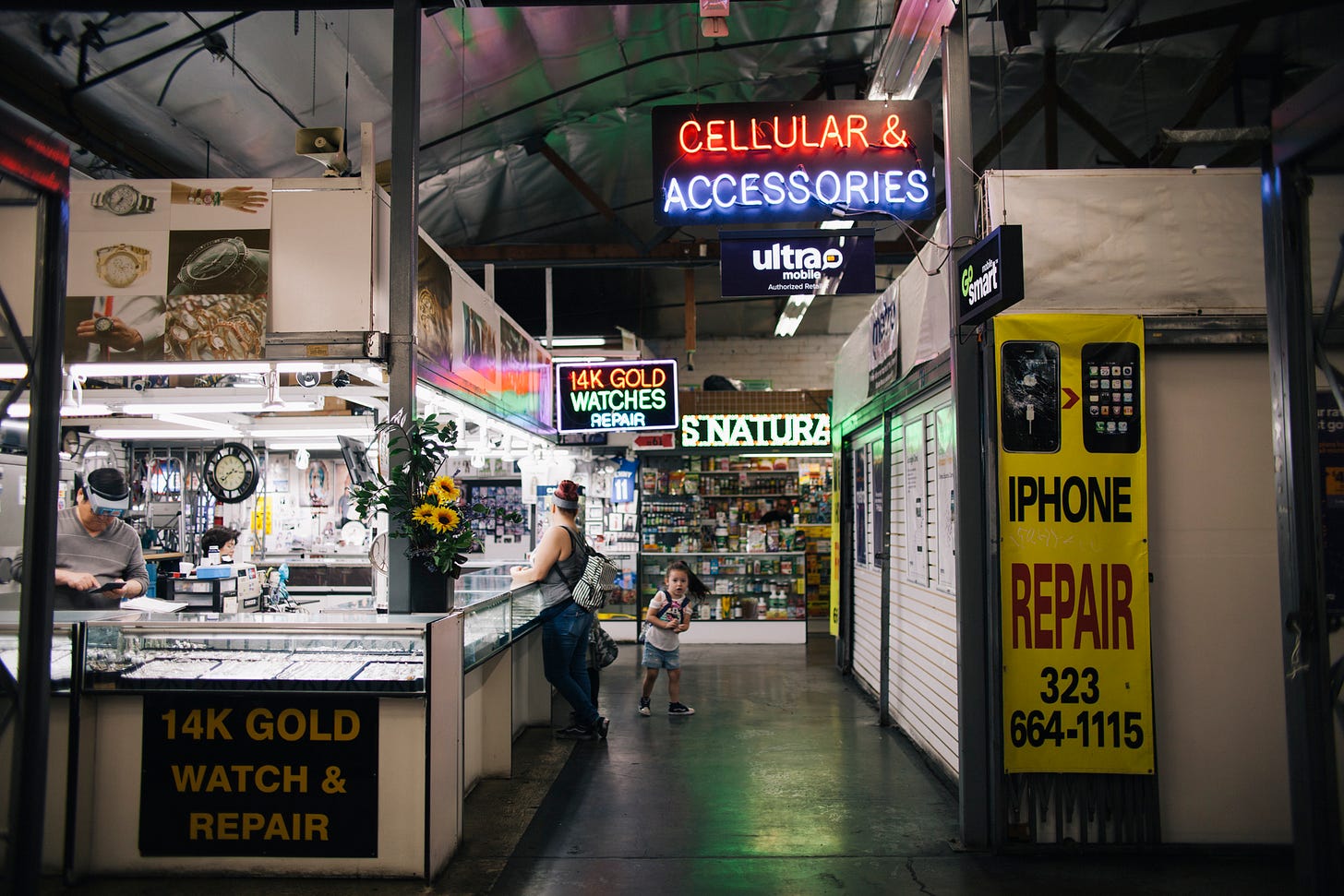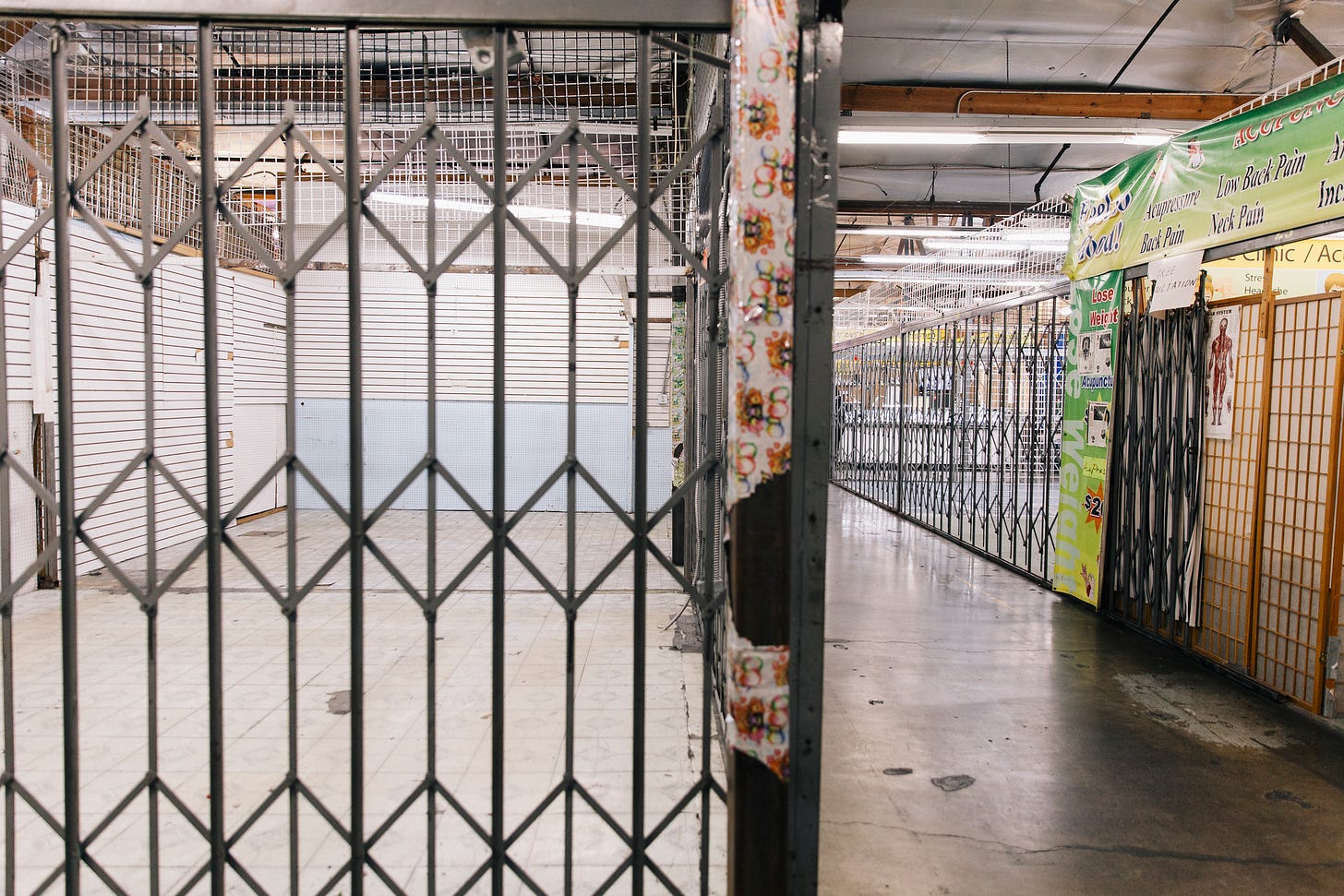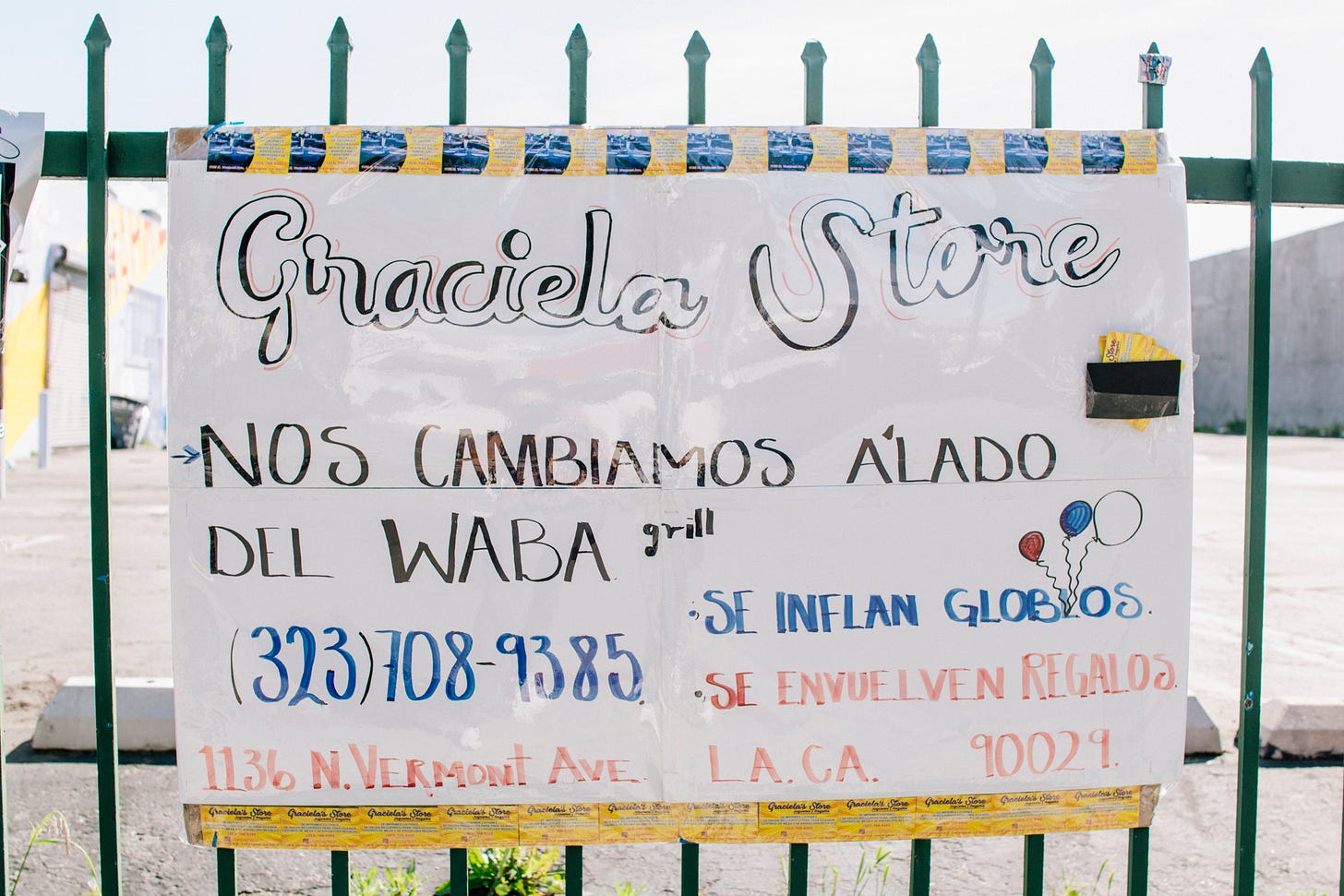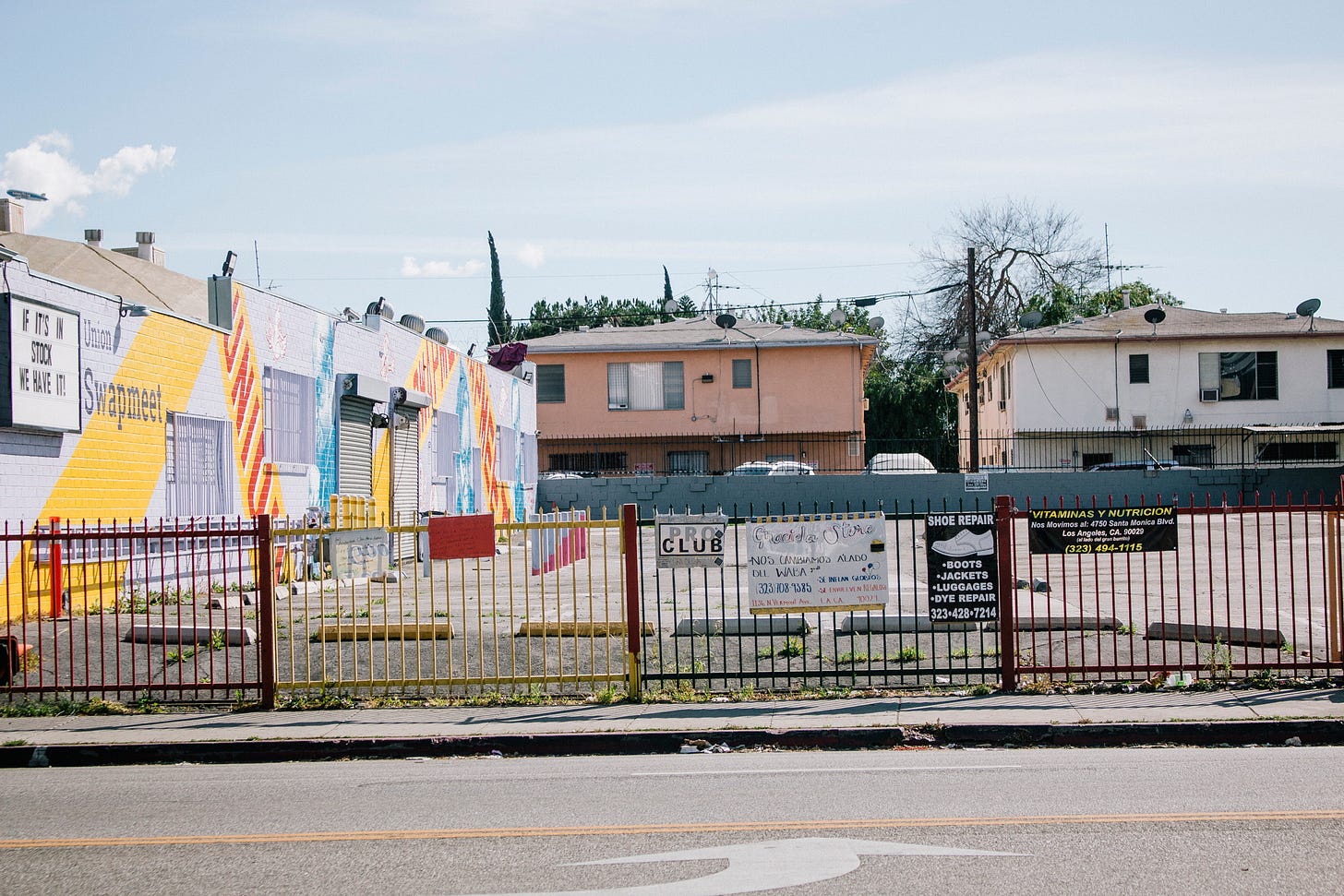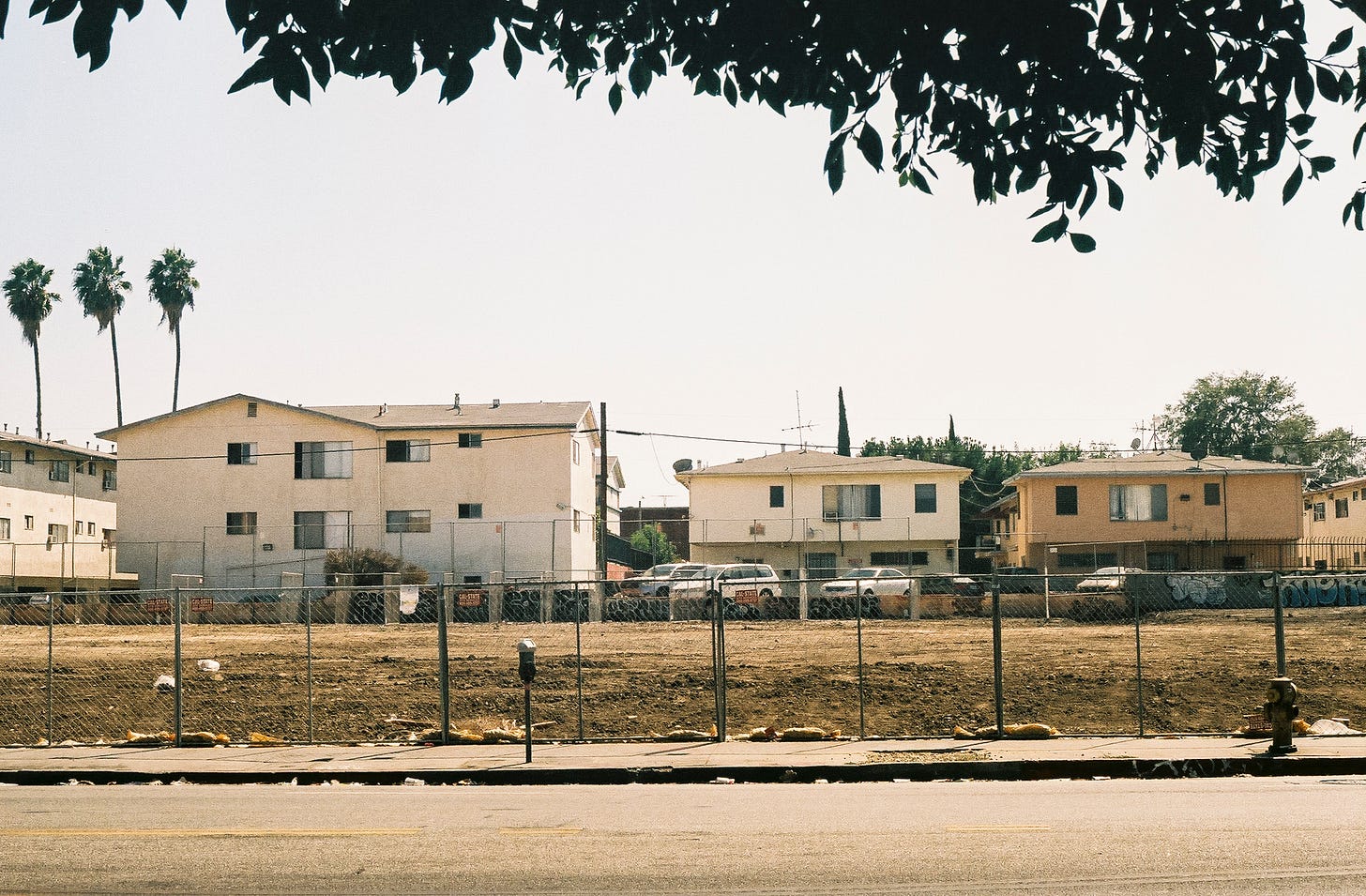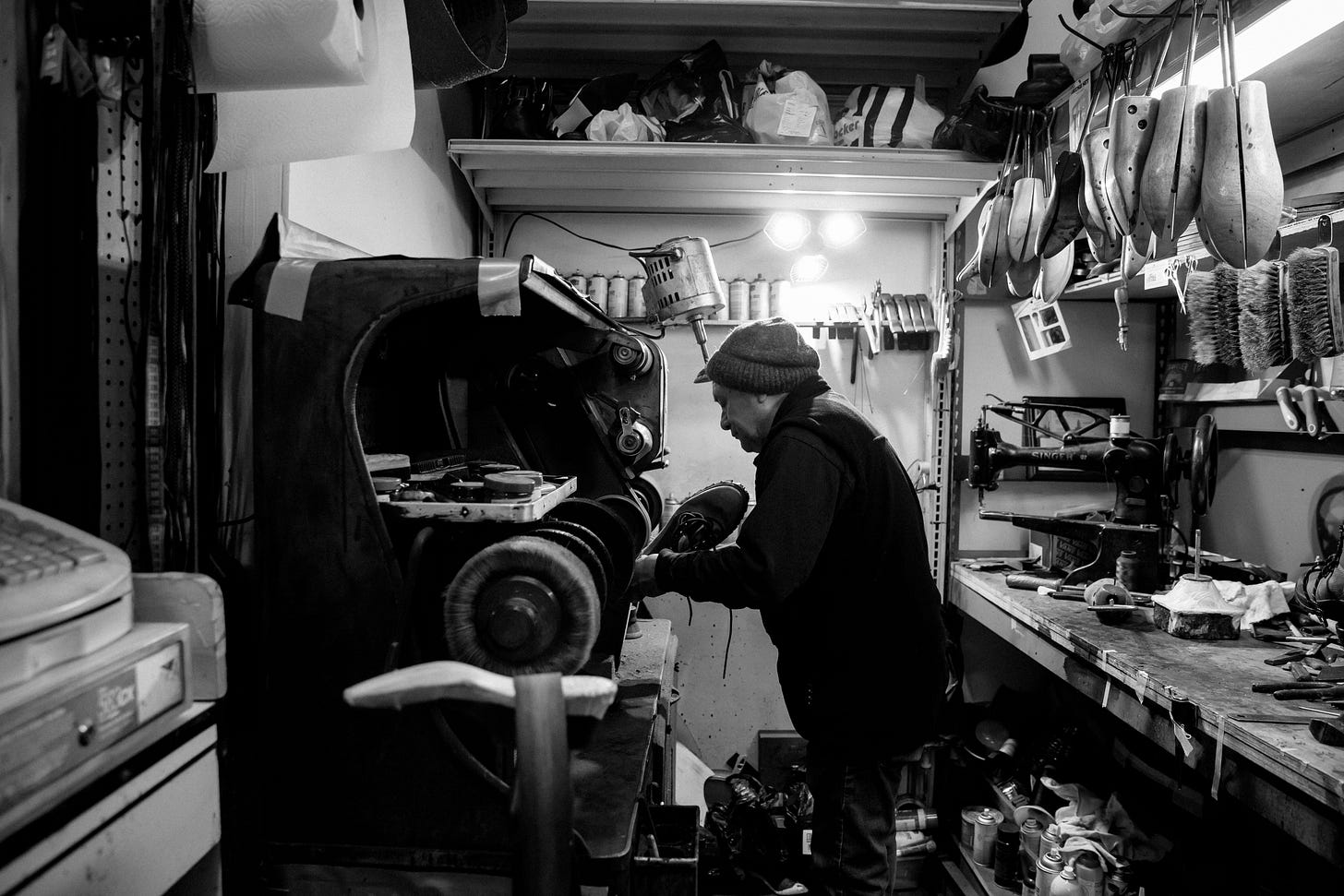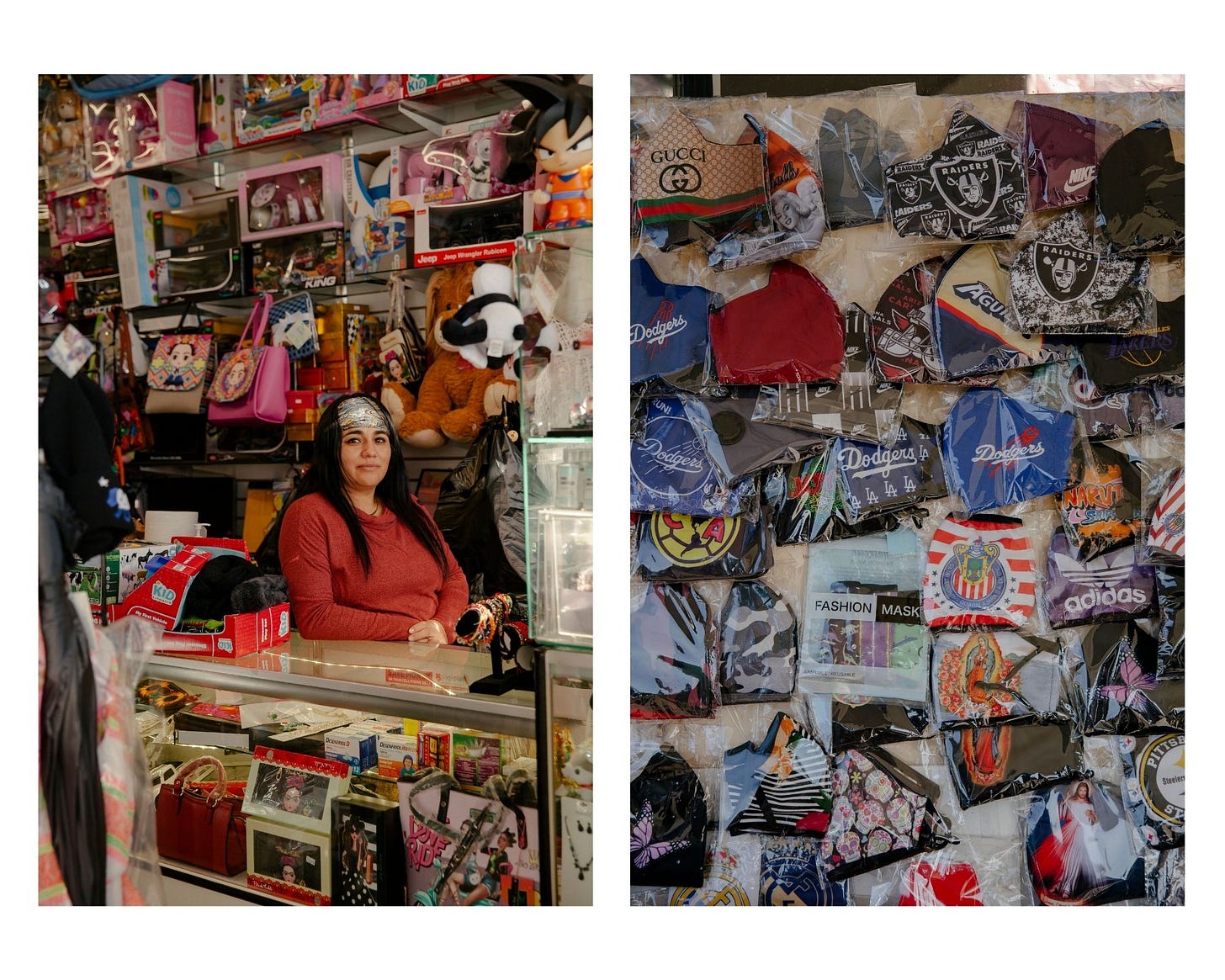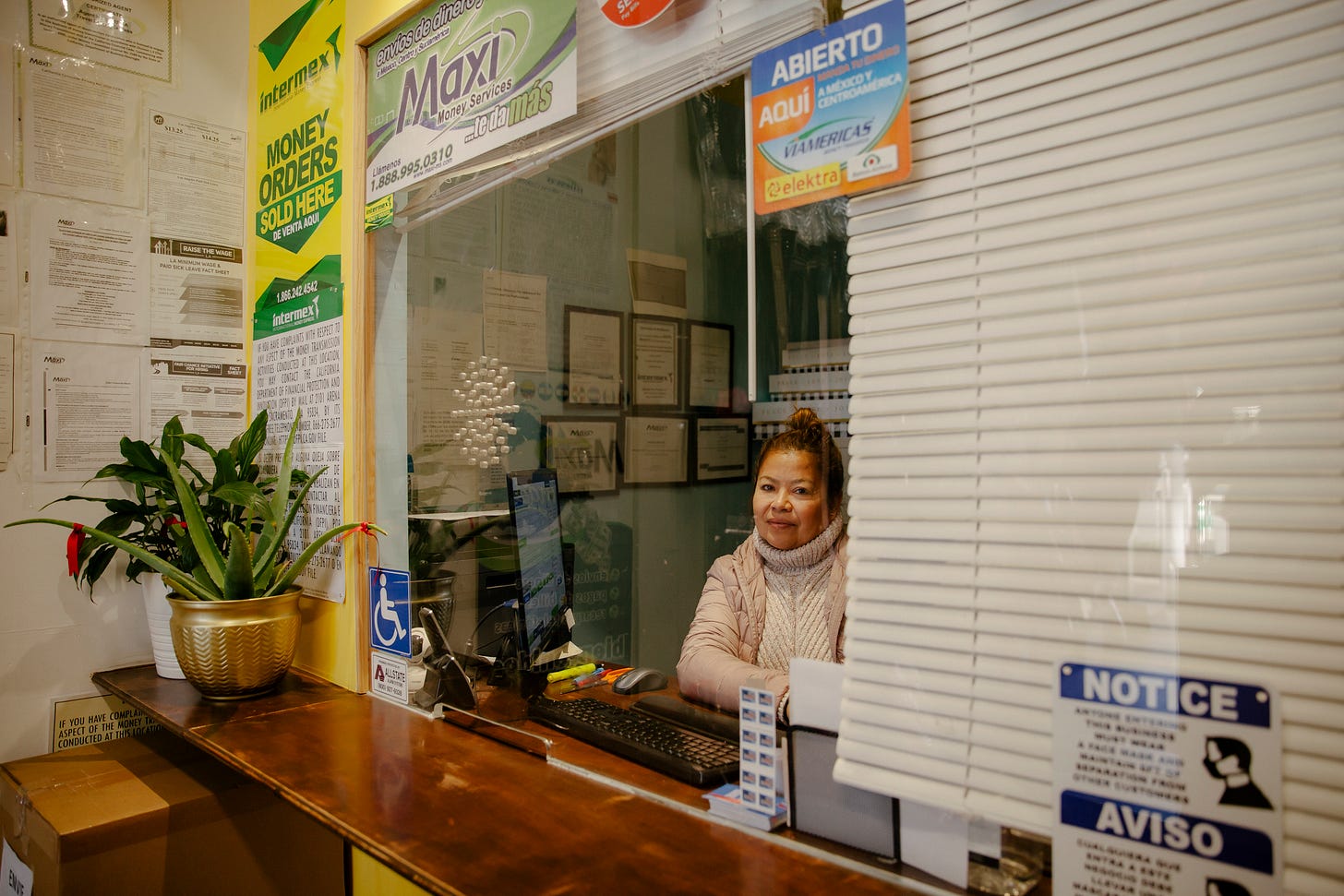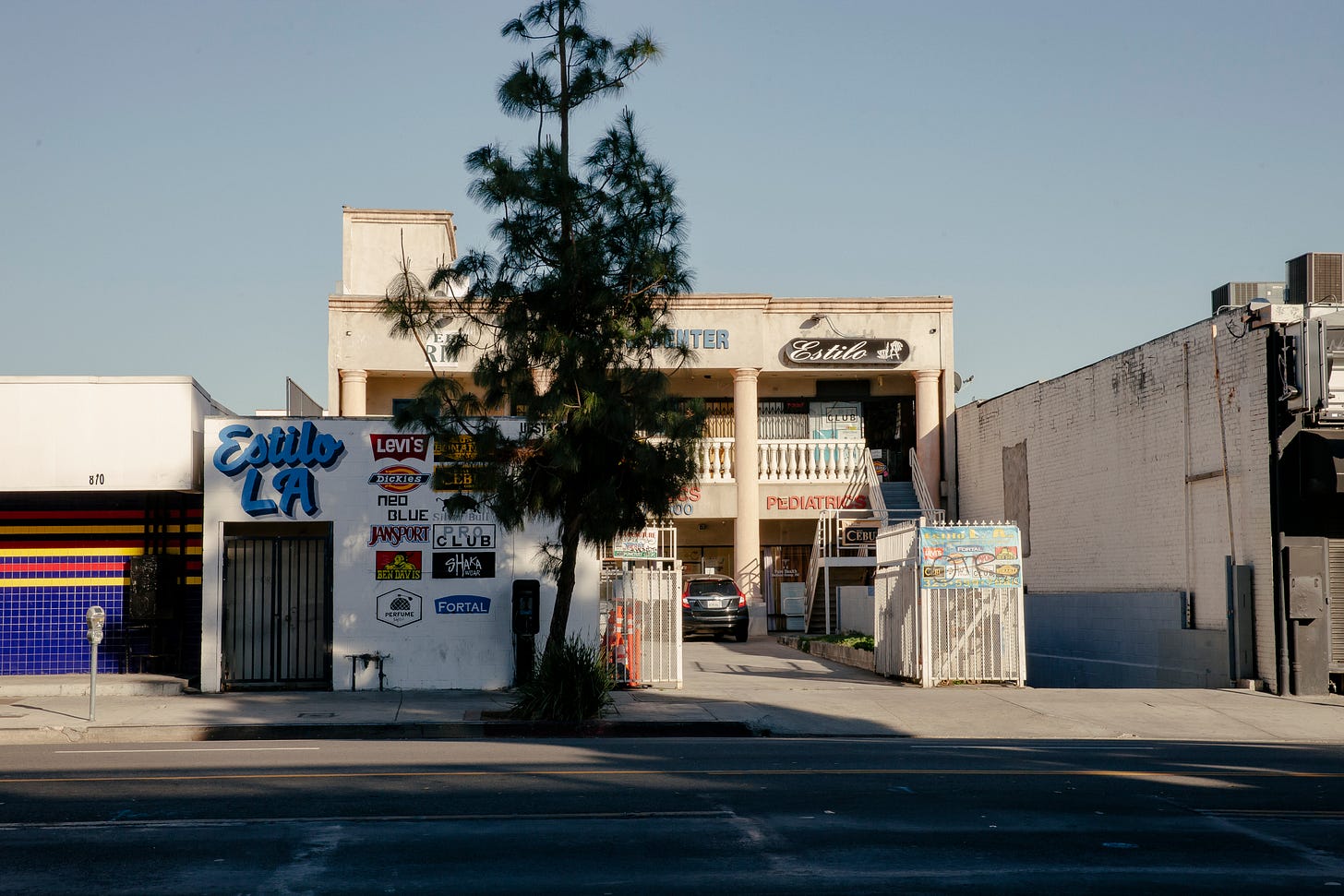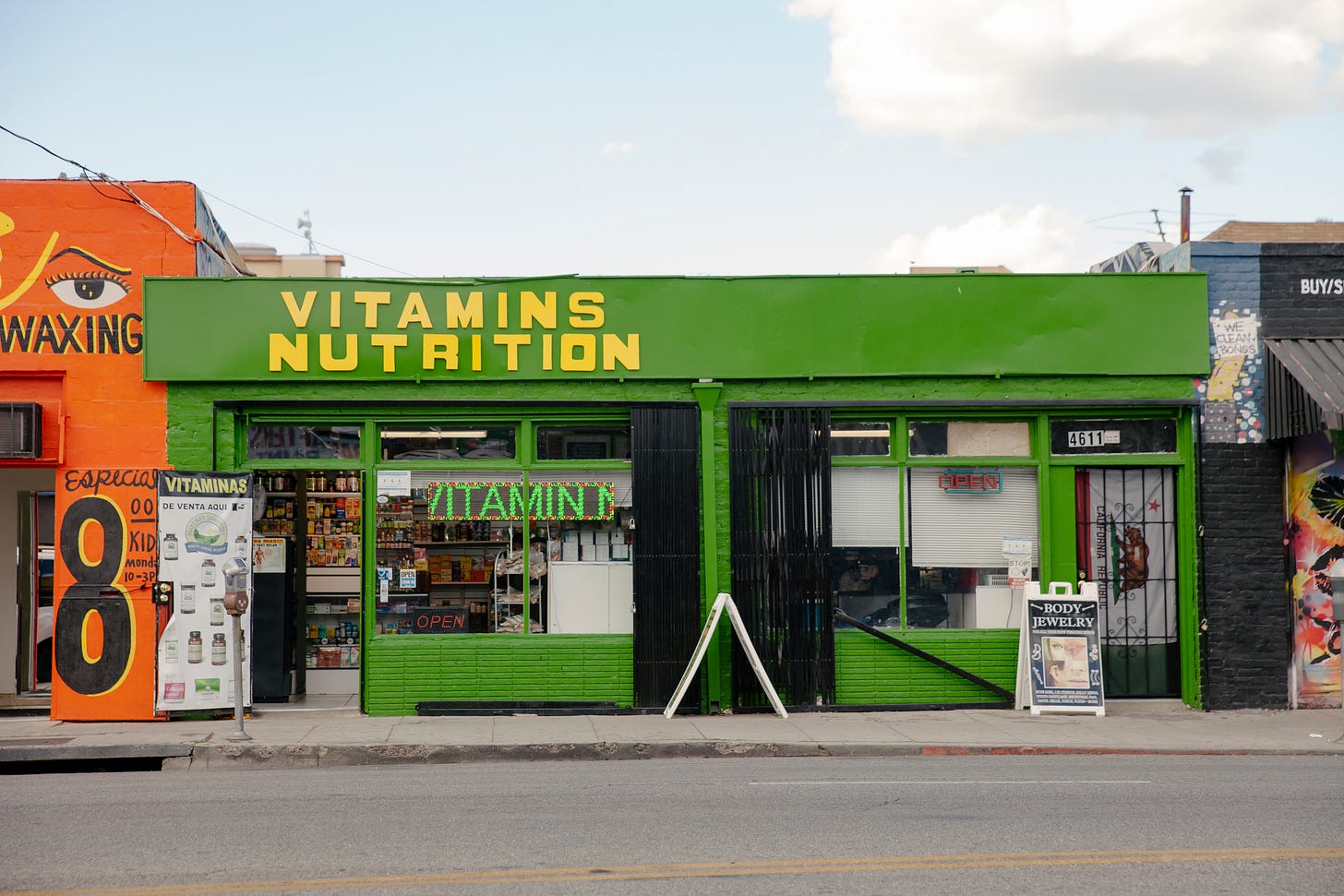Photo Essay: Former Union Swapmeet Vendors On Life After Being Displaced
Samanta Helou Hernandez visits former swap meet vendors to hear their reflections a year and a half after the market was demolished.
The swap meet is a mythic place in Los Angeles. In the ‘90s and early 2000s, it’s where kids in Black and Brown neighborhoods bought fits for school: Pro Club white tees, Dickies, Nike Cortezs, and gold nameplates. These in-door markets were a hangout very much like the malls of white America.
Swap meets are much more than an affordable place to shop, though. They’re where neighborhoods create community, re-affirm identity, and build collective memories. They’re historical landmarks. But as the city changes, people are displaced, and younger generations shop online, the swap meet’s days are numbered.
Joo Lee opened Union Swapmeet on Vermont and Santa Monica Blvd in 1986. He modeled the concept on ones from his home country of Korea that allowed multiple people to own businesses in one place. For merchants, the rent was more accessible than a traditional brick-and-mortar, and it attracted new immigrants who wanted independence but didn’t have the capital for a larger enterprise.
At the height of Union Swapmeet in the ’80s and ’90s, lines of people would wait to shop at 70 different stalls.
Families sent money to their home countries and bought clothes, toys, and pets. They could get acupuncture, a haircut, tailor clothes, eat, and buy alternative medicines from Mexico, all in a day. In East Hollywood, a trip to Union Swapmeet was an all day affair.
Naturally, friendships formed. Kids who grew up going to the swap meet with their families later took their own children. Some patrons went on first dates here and others even met their spouses.
Joo retired in 2016, leaving Union Swapmeet in the care of his two daughters and son-in-law. The Lees adapted to the changing demographics of the neighborhood by repainting the exterior with murals of long-time vendors and even added an Instagrammable set of wings. They threw pop-ups and a heavily attended Hong Kong-style night market and tried to fill some stalls with Etsy vendors.
It wasn’t enough.
In 2019, the Lees struck a deal with Koreatown developer Jamison Services to demolish the market and turn the property into a seven-story residential and retail complex.
Throughout that year, customers continued to trickle in to pay their cell phone bills, buy jewelry, and visit longtime friends until the swap meet officially closed in February of 2020, right before the pandemic lockdown. A locked fence kept hopeful shoppers out as they walked by trying to visit one last time. Signs from vendors hung on the market’s exterior announcing their new locations. Inside, the stalls were empty.
On July 7, 2020, bulldozers began tearing down the walls of the once bustling swap meet. Community members stopped to witness as over 30 years of memories crumbled into brick and dust. Within a week, the swap meet was completely razed.
While all that remains of the Union Swapmeet are cherished memories, many of the vendors continued on, renting brick and mortar spaces in East Hollywood and Koreatown in the hopes of attracting their old customer base. Others retired or found different jobs. Some are doing better than others, but most miss the camaraderie of the swap meet.
I checked in with some of the Union Swapmeet vendors this February 2022, a year and a half after it was demolished. These are their reflections:
Francisco Sum Gutierrez, F&G Shoe Repair, 1137 N Vermont Ave, Los Angeles, CA 90029:
Francisco has been repairing and making shoes since he was an 8-year-old in Guatemala. When he migrated he continued to practice his trade, working for other shoe makers until he opened his own business at the Union Swapmeet in 2000. For 20 years, he ran a successful operation until he was forced to close and move elsewhere when the swap meet shut down. He found a nearby stall behind a computer repair store on Vermont Avenue, just a few blocks from where the swap meet once stood. But because he’s in the back of an existing store it’s often difficult for people to find him. For now, he mostly relies on loyal customers who followed him here from the swap meet but he does worry about the dip in business.
"Al principio cuando era niño y estaba aprendiendo el trabajo no me gustaba la zapatería pero empecé a ver que da dinero, y después me encariñe con los zapatos."
"Cuando cerró el swap meet sentí nostalgia, como que hubiera perdido algo porque ahí estuve toda una vida, 20 años de estar en un mismo lugar y tener que salir de la noche a la mañana fue difícil. Sentí tristeza. Pero sigo. Ya estoy recuperando mi clientela, no toda, pero algo."
"Extraño la compañía de todos los inquilinos en el swap meet. Y también el ambiente que era más alegre. En el swap meet nunca deja de pasar gente porque hay muchos negocios entonces llegan por una cosa, pasan frente a uno, y preguntan sobre mi negocio. Aquí solo viene gente que va a reparar zapatos."
"Este lugar me lo recomendó Graciela que también estaba en el swap meet y ahora está frente de donde yo estoy. Sería bueno estar en la parte de enfrente. Pero para rentar un lugar donde estoy en frente es demasiada cara la renta."
"Mi deseo es tener más trabajo y salud porque el futuro para mi ya no veo mucho porque ya voy llegando a la meta. Tengo 68 años. Voy a seguir hasta cuando ya no pueda o me muera, pero mientras pueda y tenga fuerza voy a seguir trabajando."
"At first when I was a child and I was learning this job I didn't like the shoe repair trade, but I began to see that it makes good money, and then I fell in love with shoes.
When the swap meet closed I felt nostalgic, as if I had lost something because I was there for a lifetime. 20 years of being in the same place and then having to leave overnight was difficult. I felt sadness. But I'm still here, recovering my clientele, not all of it, but something.
I miss the company of all the tenants at the swap meet. And also the atmosphere was more cheerful. At the swap meet people never stop passing by because there are many businesses so they come for one thing, pass in front of you, and ask your business. People only come here to repair shoes so there’s not that opportunity to make a new customer.
This place was recommended to me by Graciela who was also at the swap meet and she’s across the street from me. It would be nice to be in the front of the store. But renting a place where I'm in front is too expensive.
My wish for the future is to have more work and good health because I don't see much of a future for me because I'm already reaching the finish line. I'm 68 years old. I'm going to continue until I can't or I die, but as long as I can and have strength I'm going to continue working."
Graciela Medina, Graciela’s Store: Juguetes y Regalos, 1136 N Vermont Ave, Los Angeles, CA 90029:
Graciela Medina started working at Union Swapmeet when she arrived in the United States 20 years ago. Her brothers had a gift-wrapping and party decoration stall at the market. But after the 2008 recession, when business dipped, she took it over, at times cleaning houses just to make ends meet. She survived by diversifying her business and adding toys and jewelry in addition to the party supplies. Graciela says that instead of the business supporting her, she was supporting the business. By the time the swap meet closed in 2020, she had already found a storefront on Vermont Avenue, which she leased alongside two other swap meet vendors, a money transfer business and an eyebrow threading salon, who were both relocating. Then the pandemic hit and she was forced to close for a month. As a single mother of an 8 and 12 year-old, Graciela worried about making rent. She immediately started selling masks and tailoring her merchandise to meet consumer needs. Today, she says business is better than at the swap meet, mainly thanks to mask sales.
“Cuando nos dijo que el swap meet se iba a vender, yo empecé a buscar [otro] lugar y dije pues qué mejor que [sea] cerca del swap meet porque por aquí están todos los clientes. Muchas personas del swap meet querían [estar en] este lugar. Y gracias a dios fuimos las elegidas.
La diferencia es que aquí estoy en mi propio lugar, no tengo que darle cuenta a nadie de que vendo o no vendo. Aquí puedo meter más mercancía diferente. Como estoy en la calle puedo poner mercancía afuera y he conocido mucha gente nueva que en el swap meet no me miraba. Con la pandemia empecé a vender mascarilla y ha llegado mucha gente nueva.
Siempre de algo malo hay que buscar algo bueno.Yo lo he buscado de todo. E intentado de todo. En el swap meet empecé con decoraciones, después puse juguetes, aquí la mascarilla. Como veo que llegan muchos hombres del trabajo a mandar dinero a sus países, trato de tener lo que a ellos les llama la atención: carteras, cinturones, playeras. Todo para seguir adelante.
Estamos mal acostumbrados a pedir precios más baratos a los negocios pequeños, cuando tu sabes que en las tiendas grandes tu tienes que pagar lo que es el precio más el tax, no se negocia. Un negocio pequeño a veces te va dar un precio un poco más caro porque tiene que pagar taxes y tiene que pagar renta y hay más gastos. Pero yo digo lo contrario, a mi me encanta comprarle a los hispanos para que nos apoyemos unos a otros. Si fuéramos más unidos, seríamos una potencia bien grande.
Mis deseos son que todo esto siga creciendo, que diosito me siga mandando más clientes. Y si no se puede aquí, pues en otra cosa. El chiste es que nunca te puedes dar por vencida.”
“When they said they were selling the swap meet, I immediately started looking for a new place and said, well, what better than near the swap meet because all the clients are here. Many people at the swap meet wanted this space. And thank God we were the chosen ones.
The difference is that here it's my own place. I don't have to tell anyone if I'm selling or not selling. I can sell whatever kind of merchandise I want. Since I'm street facing, I can put merchandise outside and people pass by and see me, where at the swap meet not everyone passed by my stall. With the pandemic I started selling masks and I’ve made many new customers that way.
You always have to find the good in the bad. I have tried everything. At the swap meet I started with decorations, then I put toys, here I started selling masks. Since I see that many working men come here to send money to their home countries, I try to have what catches their attention: wallets, belts, t-shirts. Everything to survive.
We are used to asking for cheaper prices from small businesses, when you know that in large stores you have to pay the price plus the tax, you can’t negotiate. A small business will sometimes give you a slightly more expensive price because it has to pay taxes and has to pay rent and there are more expenses. But I do the opposite, I love to buy from Hispanics so that we support each other. If we were more united, we would be a very great power.
My wishes are that all this continues to grow, that God continues to send me more clients. And if we can't make it here, then I’ll find something else. The point is to never give up.”
Liliana Ochoa, Travel Latino Express, 1136 N Vermont Ave, Los Angeles, CA 90029:
Liliana Ochoa opened her money transfer and check cashing business at Union Swapmeet in 2004. Her business services predominantly Central American and Mexican immigrants who send money to their home countries. Over nearly 20 years, she’s built a loyal clientele who trusts her to take care of their money. Most of them have followed her to the new location on Vermont Avenue. Liliana and Graciela share the same storefront, and they both say business is better than at the swap meet.
“Cuando se cerró el swap meet sentí un poco de nostalgia por los años de estar ahí. Y un poquito de incertidumbre porque no sabías como te iba ir y donde iba a encontrar un lugar. Después dije bueno, por algo suceden las cosas. Encontré este lugar muy cómodo y muy cerca de donde estaba el swap meet. Fui la última que salí del swap meet, prácticamente me sacaron. Yo salí el 16 de febrero del 2020. Todo el mundo se salió antes. Mis clientes me ayudaron a tumbar mi oficina el ultimo dia. Pero ya tenía este espacio porque lo agarramos un mes antes.
Extraño a los compañeros del swap meet, era muy bonita la convivencia. Lo bueno es que la mayoría estamos cerca entonces nos miramos, como el zapatero.
Pero aquí no tenemos la presión de tener un manager como en el swap meet. Tenemos nuestra propia llave. Abrimos y cerramos cuando queremos. Tenemos más libertad aquí que en el swap meet.
Tengo mas clientes aqui. Me va mucho mejor. Tal vez es porque estamos en la calle. Todos mis clientes me siguieron aquí y he agarrado muchos nuevos también.
La mayoría de mis clientes son gente humilde que viene a trabajar, hacer dinero. Tienes dos, tres trabajos y vienen y cambian sus cheques. Algo que estoy notando ahorita es que hay mucha gente nueva en este país tanto de guatemala como de méxico. Las familias están trayendo a sus familiares a trabajar a Estados Unidos y entonces me los traen para hacer sus envíos y cambiar sus cheques.
Lo que me gusta más de mi trabajo es atender a los clientes. Darles mi confianza a ellos. Llegan ellos y están solos en este país, y sienten la necesidad de hablar y me confían sus cosas. Eso es bien bonito.
Ellos se sienten confortables con la bienvenida que les doy cuando llegan a este país. Porque yo recuerdo cuando llegué también. Como no los voy a entender si todos llegamos prácticamente igual a este país con el sueño, con unas ganas de hacer algo en tu país, ayudar a tu familia.
Ya me quiero retirar. Tengo tres hijos entonces se los paso a ellos. Quiero retirarme joven. Tengo 55 años. Yo he trabajado mucho desde chiquita entonces te entra el cansancio prematuro.
Siempre he querido poner un restaurante de comida Mexicana. Tengo mi visión de poner todo asado, carne, pollo, mariscos, pescado. Enfocarse en preparar bien las cosas. Pero mi idea es ponerlo en México. Porque aquí solo trabajaría para pagar la renta.”
“When the swap meet closed I felt a bit nostalgic because of all the years I spent there. And also a little bit of uncertainty because I didn't know how it was going to go and if I was going to find a new place. Then I said well, things happen for a reason. I found this place very comfortable and very close to where the swap meet was. I was actually the last one to leave the swap meet; they practically kicked me out. I left on February 16, 2020. Everyone left before me. My clients helped me knock down my office on the last day. But I already had this space because we rented it a month before.
I miss the other vendors at the swap meet, the cohabitation was very nice. The good thing is that most of us are close so we still see each other, like the shoemaker.
But here we don't have the pressure of having a manager like in the swap meet. We have our own key. We open and close when we want. We have more freedom here than at the swap meet.
I have more clients here. I'm doing much better. Maybe it's because we're street facing. All my clients have followed me here and I have made many new ones as well.
Most of my clients are humble people who come to work, to make money. They have two, three jobs and they come and cash their checks. Something I'm noticing right now is that there are a lot of new people in this country, both from Guatemala and Mexico. Families are bringing their relatives to work in the United States, and then they bring them to me to do their money transfers and to cash their checks.
What I like most about my job is serving customers. I earn their trust. They arrive and they are alone in this country, and they feel the need to talk and they trust me with their things.
They feel comfortable with the welcome I give them when they arrive in this country. Because I remember when I arrived too. How can I not understand them? If we all arrived practically the same in this country with a dream, with a desire to do something in your country, to help your family.
I’m ready to retire. I have three children so I’ll pass the business onto them. I want to retire young. I am 55 years old. I have worked a lot since I was little, so I have premature fatigue.
I have always wanted to open a Mexican food restaurant. I have my vision of having a restaurant where everything is grilled: meat, chicken, seafood, fish. And I focus on preparing a few things well. But my idea is to put it in Mexico. Because here I would only work to pay the rent.”
Maria Sandoval, Estilo LA, 866 N Vermont Ave, Los Angeles, CA 90029:
Maria grew up at Union Swapmeet. Her mother Olga, was one of the first vendors to open a stall back in 1986. She specialized in selling Latin music records and cassettes. Her curated selections of cumbia, punta, merengue, and norteño were popular with Mexican and Central American immigrants who lived in the area. As technology evolved, she did too, eventually selling incense and glass pipes. Once Maria was an adult, she opened a stall of her own selling mens clothes and shoes. People went to her for Cebu boots, Pro Club t-shirts, and Dickies. Maria’s own children also grew up in the swap meet. When the market closed, her mom retired and Maria moved her clothing store to Vermont Avenue. Business is a lot slower than at the swap meet. But what Maria misses the most is the family feel of the market.
“It was really sad when the swap meet closed because it was like a big part of our life. You know, my kids grew up there. It was our life. It was sad how they could just come and kick you out like you're nothing. There was no consideration for anything.
Over there we were like a family. We've been around each other for so long, we practically live with each other. We didn't just leave a space, we left our friends. Here you're alone. Over there you had all these people helping you and being there supportive.
We've had our customers for so long. We told them we were moving here and slowly they all started coming. But it’s been hard mostly because of COVID. A lot of people are going through it. They lost their jobs. They got sick, they lost family. Everything's lower because we have lost some of our customers. There was definitely more foot traffic at the swap meet. We're barely getting new customers. It’s slowly getting better
It's a word of mouth thing. We have new customers, but we have a lot of old customers, our loyal customers that follow us.
I hope that this business is successful and we are as successful as at the swap meet.
My husband jokes and says, “you guys left the swap meet and came and made another little swap meet.”
Americo Perez, Vitamins Nutrition, 4611 Santa Monica Blvd, Los Angeles, CA 90029:
Americo had a stall at the swap meet selling teas, vitamins, and other natural medicines for 13 years. When the swap meet closed he moved to a storefront across the street on Santa Monica Blvd. While business is currently slow, he prefers having his own space and the independence it gives him.
“Cuando iba a cerrar el swap meet no sabíamos ni que hacer porque teníamos que encontrar un lugar por fuera y la renta es más cara. No sabíamos cómo nos iba ir pero gracias a dios aquí estamos.
Está mejor acá porque es independiente. La renta es más cara pero hay chance de vender más. Me siento mejor acá, puedo abrir y cerrar cuando yo quiero. Si quiero trabajar los 7 días puedo. Allá no podía.
Me gusta mi trabajo, atender a la gente, me gusta ver la medicina. Se recomiendan las diferentes cosas. Lo que se vende más son las multivitaminas, los aceites se venden, hierbas para la próstata, para los riñones, limpieza del hígado. Mis clientes son latinos y a ellos les gusta la medicina natural. Cuesta más que trabajar, es un proceso, pero si sirve.”
“When the swap meet was going to close, we didn't even know what to do because we had to find a place outside and the rent was more expensive. We didn't know how it was going to go but thank God here we are.
It's better here because I'm independent. The rent is more expensive but there is a chance to sell more. I feel better here, I can open and close when I want. If I want to work 7 days I can. I couldn't do that at the swap meet.
I like my job. I like serving people. I like learning about medicine. I recommended different things. What I sell most are multivitamins, oils, herbs for the prostate, for the kidneys, liver cleanses. My clients are mainly Latino and they like natural medicine. It takes more for it to work, it is a process, but it works.”





